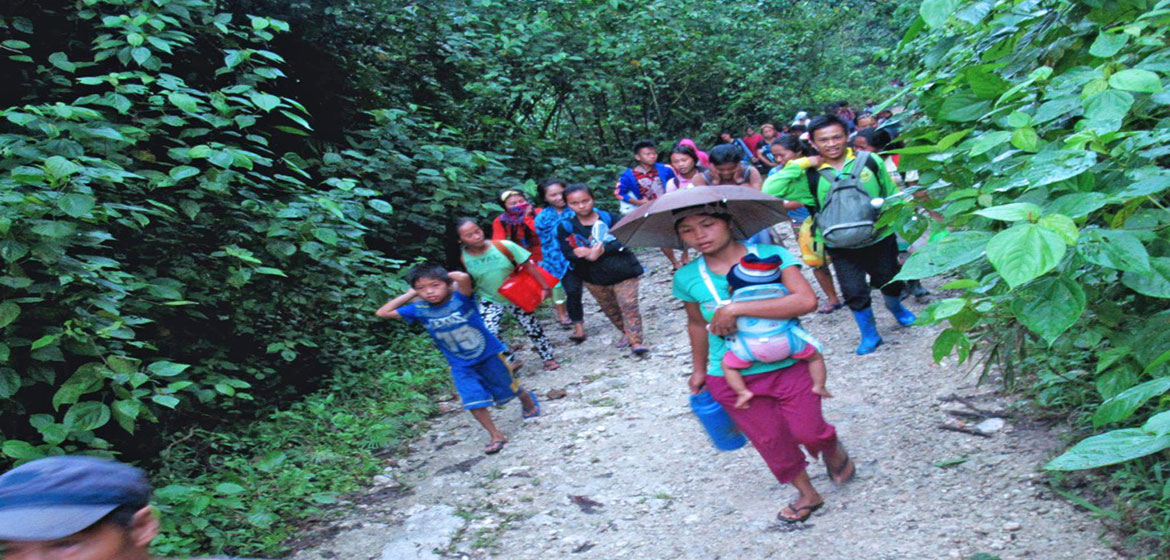DAVAO CITY, Philippines – Twelve indigenous peoples’ communities fled their homes in Surigao del Sur due to the heavy military presence in the area, a Lumad group reported.
Sarry Campos, spokesperson of MAPASU or the Malahutayong Pakigbisog Alang sa Sumusunod, a local IP group, told Davao Today in a phone interview that at least 161 families composed of 758 individuals are currently seeking refuge in Km. 9 Barangay Diatagon, Lianga town, while unaccounted number of individuals are currently staying with their relatives.
The Lumad communities decided to evacuate on Monday, January 29 due to series of threats, harassment and intimidation allegedly by military troops.
“How can we go to our farmlands if the military troops are present around the community? Lumad farmers were interrogated and were asked to present their identification cards,” Campos said.
He added, “clearly they are harassing civilians. If they failed to provide IDs, soldiers will take photos and threaten them that if something will happen to military troops, the state forces will go after the civilians.”
A civilian was also forced by the soldiers to surrender “even he vehemently denied he was an NPA member.”
Also affected were 706 students and 51 faculty staff of alternative Lumad school Alternative Learning Center for Agricultural Development (ALCADEV) and Tribal Filipino Program of Surigao del Sur (TRIFPS).
Classes were suspended at the school but the faculty continued lessons inside the evacuation center.
Campos said that the “intensified military operations in the countryside especially in Lumad communities clearly shows that the military is not going after the NPAs but communities and organizations that struggle to defend their ancestral lands from mining and foreign corporations.”
Kahugpungan sa mga Lumadnong Organisasyon (KASALO) – Caraga said in a statement that eight battalions of the Armed Forces of the Philippines (AFP) under two brigades were deployed in the region “resulting in widespread human rights violations.”
“All these are being implemented to eliminate opposition against the continuing operation of 23 large scale nickel, chromite and gold mines and the entry of 15 coal mining operations, expansion of banana and oil palm plantations and other destructive projects within our ancestral lands,” it added.
On Thursday, Duterte told the Lumad delegates of the indigenous peoples leaders summit in Davao that he wants ancestral domain in Mindanao to be opened for investors.
“I’ll do the search of investors myself,” he said.
Duterte said this would help for the development of Lumad communities and assured leaders that they will be given chance to decide.
“Kung muingon mo dili mag-mina, dili (ta) mag-mina. Kung mag hugaw-hugaw sa inyong lugar, barahon nako (If you don’t want mining, then we won’t do it. If they’ll mess around your area, I’ll block them),” Duterte added.
But for Campos, the entry of big companies does not mean real development for Lumad communities.
“For decades, we have witnessed other areas where mining operates but there was no real progress as these operations only destroyed the natural environment and people’s livelihood,” Campos said.
Campos urged the Duterte administration to pull-out military troops from civilian communities.
“He [Duterte] should respect our right to self-determination and ancestral lands. We can develop our own communities through our indigenous practices in agriculture and free education,” he added.
Source:
Related to SDG 16: Peace, Justice and Strong Institutions, SDG 10: Reduced Inequalities and SDG 15: Life on land



